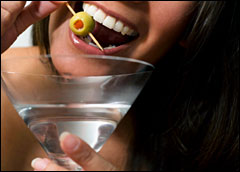Hi Umbra,
After an epic weekend of drinking, I realized I’ve never seen or heard about any organic liquors. I’ve seen organic beer and wine, but never any organic gin, vodka, scotch, etc. Any chance I can drink in the future without having to feel guilty about not being organically drunk?
David Tucker
Rockville, Md.
Dearest David,
Isn’t the whole point of drunkenness insulation from guilt and its fellow emotions? Don’t feel guilty. No, I’m not advocating drunkenness as a solution to environmental troubles — and no, I will never forgive my editor for liking this question, thereby forcing me to read the advertising pap on an organic vodka site. Apparently, “happily, doing good no longer means doing without.” Also, there is now something called “eco-chic.” It’s a movement. What I miss down here in the basement.

Organic liquor for olive us!
Photo: iStockphoto
But before I can investigate eco-chic, back to drunkenness: popular for centuries, and now available organically certified, or at least organic-ingrediented. The following is a quick sampling of organic wares I have come across (though not tossed back): American-made vodkas, a London-distilled gin, a Philadelphia gin, a couple of whiskeys and a brandy, and a Paraguayan (!) rum. (Did Stroessner live long enough to do bad without doing without?)
For your home liquor cabinet, then, you will be able to stock the organically sourced basics. When you’re out on the town with other eco-chic peeps, though, it’ll be a bit tougher. Restaurants and bars that market themselves on organically based menus are most likely to carry these new spirits, so you’ll have to research what’s available on your usual route to drunkenness. (Don’t forget, drunkenness is made safer for all through use of public transit.) I think the internet will do you right, because if restaurants are carrying these spirits, they should be putting it on their websites for all to know.
To answer the assumed next question, organic spirits are fairly low on the priority list of lifestyle changes. We consume less liquor than we do solid food, hence we should prioritize organic (and local) food in our budget, and even prioritize eating less meat over drinking more organic liquor. Yes, “doing without” still has its ecological proponents. Hip to be square, man.
I feel confident prioritizing within liquors on the basis of their source. Corn can be genetically modified (36.5 million acres in the U.S. in 2003), is a huge monocrop, and uses many pesticides, so let’s make corn-based spirits, such as vodka and bourbon, number one on the organic drunk’s new shopping list. I go further with my assumption-based ranking when I presume that juniper berry production is less chemical-intensive and less feudal than sugarcane production; so I will boldly move forward and recommend organic rum as a priority over organic gin. The advertising materials make them all sound nice, however, and some of them come in very pretty bottles. A great, fun way to support organic farmers. Just remember, don’t drink and drive — and don’t drive much even when you’re sober.
Pedantically,
Umbra

